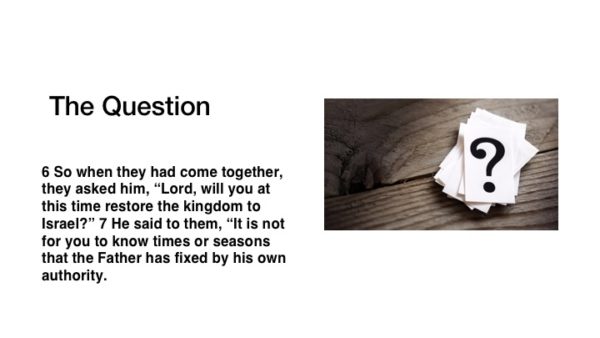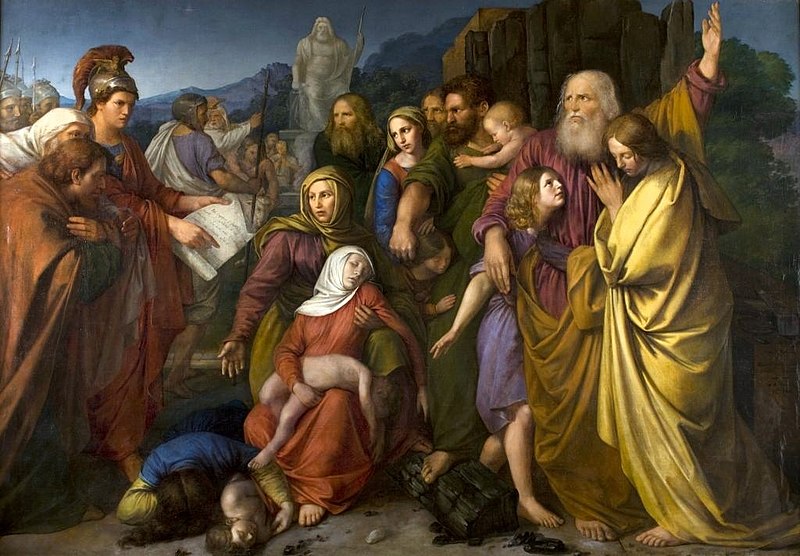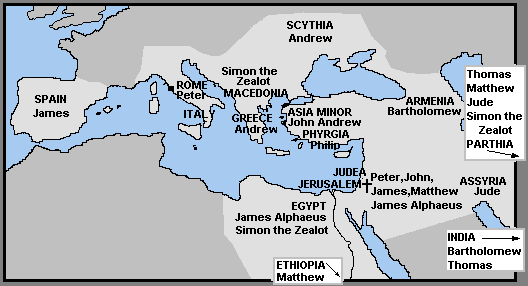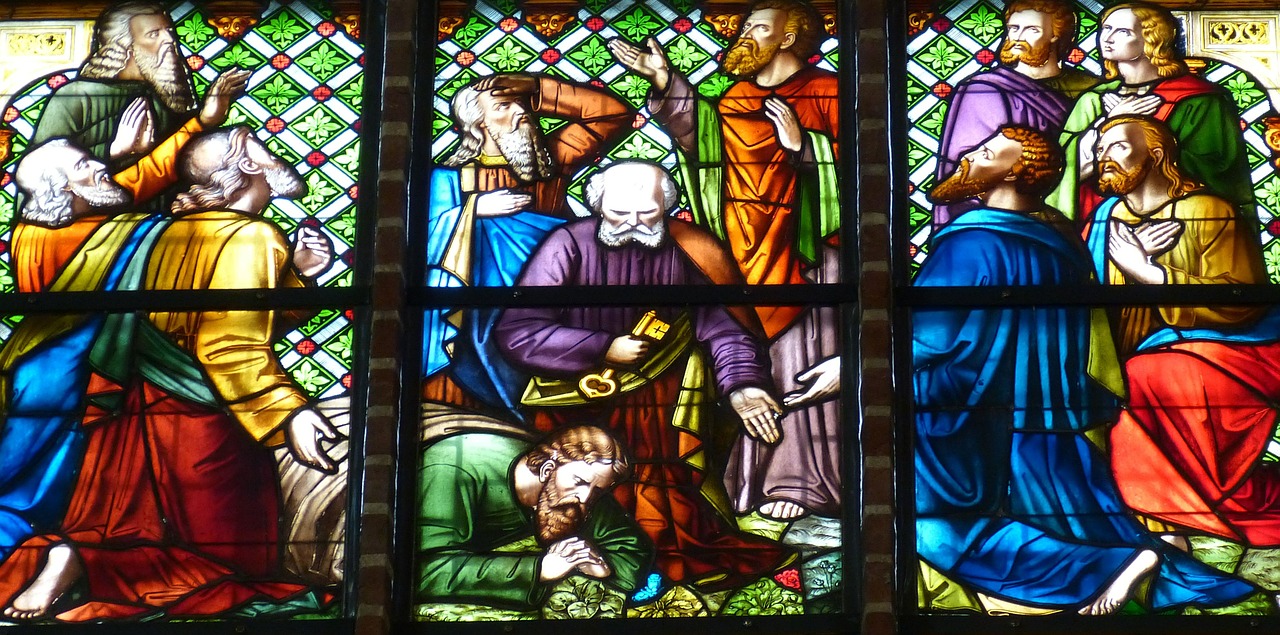THE QUESTION
It is always refreshing to see the recorded responses of the disciples to Christ’s announcement that they would soon receive the baptism of the Holy Spirit. You get to see them as the real human beings that they are. If you are anything like me, you will sometimes insert yourself into these stories and think that, “I would be all spiritual,” and such. I would say to Jesus, “Tell me more about this Holy Spirit coming!” But the truth of the matter is that I would likely do only as good as or worse than the disciples did. They asked a question of Jesus alright — but it had nothing to do with the Holy Spirit.
Notice the question in verse 6:

What were the disciples looking for from Jesus? They were looking for an earthly kingdom. They were looking for an earthly king. And this was true of pretty much any Jew of that time. Where did this come from? Why would these guys have this as their primary concern? It came from a combination of things.

Give Us a King to Judge Us!
First, it came from an age old problem for the Jews. In 1st Samuel 8, we read these words from around 1100 BC:
Then all the elders of Israel gathered together and came to Samuel at Ramah and said to him, “Behold, you are old and your sons do not walk in your ways. Now appoint for us a king to judge us like all the nations.” But the thing displeased Samuel when they said, “Give us a king to judge us.” And Samuel prayed to the Lord. And the Lord said to Samuel, “Obey the voice of the people in all that they say to you, for they have not rejected you, but they have rejected me from being king over them. 1 Samuel 8:4-7
The Jews had begged for an earthly king from the time before King Saul was anointed. God saw this as a rejection of himself as their king.
From Hundreds of Years of Being in Bondage
Second, it came from hundreds of years of Israel being in bondage to another government. That all started pretty much when the Jews were carried away captive to Babylon in around 600 BC. There was not much peace for Jerusalem after that. We call the 400 years between the end of the writing of the Old Testament and the beginning of the writing of the New Testament the silent years. This would have been the year 400 BC up to the time of Christ. But this silence was only in terms of the actual writing of Scripture. The world was anything but silent.

Wojciech Stattler‘s “Machabeusze” (“The Maccabees”), 1844
In the middle of that time period, a Seleucid king named Antiochus Epiphanies ordered an altar built to Zeus — to be erected inside the Jerusalem temple. He also commanded that pigs be sacrificed inside of it. Of course, both of these were an abomination to the Jews. This was met first with resistance and finally by an all out revolt by the political party of the Maccabees. These things can be studied about in the writings of Josephus and the books of the Maccabees. Toward the time of Christ’s birth, the Romans conquered much of the known world and the Jews went from one foreign government to another one. And so there was very little political peace in their world for hundreds of years.
Misunderstanding about Old Testament Prophecies
You also have hundreds of years of prophecy about a king from the line of David coming to save Jerusalem. So one can hardly blame the disciples for having blinders on, when it came to Christ’s intentions. These guys would love nothing more than an earthly king to ride in and put Rome in their place. They had waited patiently, and now it seemed to them, that the time was finally here. You can imagine how anxious they were for what they believed was coming, even if they misunderstood.
At the arrest and trial of Jesus as he stood before Pilate he said these words:
Jesus answered, “My kingdom is not of this world. If my kingdom were of this world, my servants would have been fighting, that I might not be delivered over to the Jews. But my kingdom is not from the world.” John 18:36
So earthly rulers were keenly interested in Christ’s claims to be a king, because they didn’t need the competition. The Jews were interested in what they thought Jesus was saying, because it served their purposes of no longer being under a yoke of slavery to other nations.
[box] But Christ, in just a few words, sets the record straight before Pilate. This kingdom that he was inaugurating had nothing to do with earthly military might. Christ’s kingdom needed no further power than what it already possessed. After all, how do you fight against a guy that you can’t kill, or if you do kill him he doesn’t stay dead?” Just ask the Avengers how that turned out for them in their last movie–not so great.[/box]
But Christ didn’t answer this question to their satisfaction, I’m sure. He had other things on his mind at this point. He knew his time with them was short. He was about to say the very last things he would ever say to them in this life. So he didn’t spend any real time talking about this imaginary political kingdom that the disciples wanted to cook up. He, instead, talked about the real power that was coming on them very soon.
His answer reflects the urgency of the moment, “Re-direct here guys — I have some things to tell you.” One of my favorite cartoon characters is a very large rooster named Foghorn Leghorn. One of Foghorn’s favorite sayings to the little chicken hawk that is always after him is, “Pay Attention kid — you might learn something.”
That seems to be along the lines of what Jesus is saying here. “We are not going to talk about that nonsense right now — pay attention to me because I need to tell you some stuff.”
Here is what he told them in verse 8:
In Luke chapter 24, Jesus is speaking to the disciples about these same events, and he says, about the coming of the Holy Spirit, that they will be ‘clothed with power from on high.’ I can’t help but think of Stephen Spielberg’s movie about President Lincoln when I see that verse. Lincoln, in trying to gain enough votes to pass the thirteenth amendment, tells a group of men in a private meeting that he is the president of the United States–clothed in immense power. Whether this was actually ever uttered by Lincoln is debated, but the fact remains that it moved the story along quite nicely, because those men left and did what the President was asking them to do.
Whether this was actually ever uttered by Lincoln is debated, but the fact remains that it moved the story along quite nicely, because those men left and did what the President was asking them to do.
Clothed in Power
Christ’s words to the disciples, in Luke and Acts are no less impactful, but not for the same reason really. The power that Lincoln was clothed in had more to do with being vested with that power from the American people. It was a proxy vote of sorts from the voters of our country to do right by them.
The power that Christ is speaking of is an actual power given to the disciples themselves from on high. The Greek word here — is dunamis.

[learn_more caption=”What Does Dunamis Mean?”] Dunamis is not just any power; the word often refers to miraculous power or marvelous works (such as in Matthew 7:22; 11:21, 23; Mark 5:30; Luke 5:17; 9:1; 10:13; and Acts 8:13). Dunamis can also refer to “moral power and excellence of soul,” according to Thayer’s Greek Lexicon. Perhaps most importantly, dunamis can refer to “inherent power, power residing in a thing by virtue of its nature, or which a person or thing exerts and puts forth” (ibid.). www.gotquestions.org[/learn_more]
You might recognize it as the root word for our English word dynamite–an explosive miracle-working power. The disciples were given the power to raise the dead and heal the sick and perform miracles. All of this was given to point to the absolute truth of the Gospel message. They were given this to prove the fact that Christ was who he said he was, because everybody knew that these guys were followers of Christ.
This dunamis power was present in each of them after the Holy Spirit came on the scene. When he indwelled them at Pentecost, they were clothed with immense power. They were clothed in power to speak, and the Holy Spirit was faithful to call souls to himself. Peter, a mere fisherman who denied the Lord three times at his arrest and trial, preached, and thousands responded in faith. In the early days of the church, this dunamis power was so evident in the lives of those whom God chose to use for his purposes.
“Go Into All Nations”
As far as the commandment goes to, “go into all nations”, was it followed? In a word I would say yes–yes it was. The gospel was spread all over the known world after this time. Consider the fact that Paul wrote letters to churches that had been established in Asia Minor or modern day Turkey — Macedonia which is situated North and West of Turkey. He went to Greece and preached and started churches there. Paul went to Rome which is even further West. There are extra biblical sources that have Paul going over into Spain as well. The apostle Thomas — remember doubting Thomas? Church tradition has him as a Patron Saint in India, because he allegedly traveled there and started churches. He is also thought to have possibly gone to Indonesia. St. Andrew was said by tradition to have traveled to Greece, Russia and the continent of Africa.

And remember when I say ‘traveled’, I don’t mean hopped on an airplane. They traveled by foot. So we are talking about years and years of obedience to Jesus!

Missons Starts at Home… with Your Own Family
As we examine these things, I think it is always good practice to talk about how they apply to us today. What is it that we are supposed to take from this teaching on the start of the early church? I don’t think that we would be taking this passage out of context at all to make some assertions about our own mission fields.
Christ said to stay in Jerusalem until the Holy Spirit came, and then he said to start in Jerusalem. You probably know where I am headed with this. If you are not clothed in power with the ministry to your own family, then don’t go and evangelize someone else’s family.
[box] If your own family is not evangelized, don’t skip over them to go elsewhere. Get clothed in power from a lifestyle of obedience, spiritual discipline and relationship with God first. Then use those relationships to evangelize those you love right there in your own home. [/box]
If things aren’t right at home, you do not have permission to leave home and start ministering somewhere else. If your house is not in order, you do not have permission to leave it in favor of somewhere else. It is not supposed to work like that. You have to get home fixed first.
Then, as home is in order, as our kids are evangelized and discipled and baptized, as we fulfill the great commission of Matthew 28 in our own living room, then we venture out in larger and larger circles, Always making sure that home is fixed before we leave it.
To be continued.
Read More:
Acts 1: The Promise of the Holy Spirit
[author] [author_image timthumb=’on’]https://koinoniachurch.info/wp-content/uploads/2017/02/Pastor-Dan.jpeg[/author_image] [author_info] Pastor Dan Woody is a founding elder for Koinonia. He has been serving churches as a pastor for the past 13 years. He and his wife Peggy are the parents of two sons, Chris and Jonathan. Pastor Dan is currently studying for his Mdiv with The North American Reformed Seminary. His interests include music, and most outdoor sports like golf, hiking, tennis and fishing. [/author_info] [/author]


